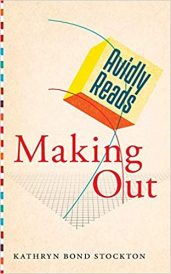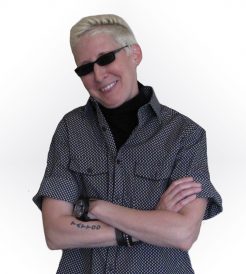 By Kathryn Bond Stockton
By Kathryn Bond Stockton
Special to Lesbian.com
Do you, ever, reflect on kissing? Maybe mid-kiss, wonder who you are, who you’re kissing, where it’s leading? Perhaps you don’t make out—now, or ever. Still, what is kissing? Why do we kiss? It can feel luscious, libidinal, friendly. It can just be friendly. But are we trying to make out something via kissing? Is it a yearning, interpretive action?
I am hot for kissing.
Tonight, I’m determined she will melt from kisses, delivered in a pattern (clever, irresistible) I am going to improvise. (Don’t ask me how.) She doesn’t know I’m kissing her with insects on my mind. Something is making our lips astir. Something somewhere flutters, making me wish I could trap a few of these kisses under glass.
All the political forces of our world are at our lips. Fragments of the world embedded in a kiss. Kissing takes me deeply into politics and thought, race and economics, sexual childhood. How does something sensual swell so dramatically into these dimensions?
Kissing itself is just plain strange. Kissing is neither hetero nor homo; trans nor cis. Children do it, too—even with adults. Asexuals and celibates may partake. But is kissing sex? Odder still, is reading? For adults and kids?
Kissing, in this book, is
strange,
fertile,
inefficient,
treasured,
tonally various,
related to reading,
beautifully
unknowable.
There’s a story here about my kissing and my reading, how I’ve read kissing, made myself out in the kisses I’ve encountered. I am revealed in kisses I bend to.
Take back “revealed”: strewn is more like it; I, whoever I may be, am strewn, splayed across my memories. Memories I love as I distrust them. Thus, in all that follows, I recall kisses from across my life: the “Hollywood kiss” I request when I’m six, raising thorny issues of gender identity; Devin trying to kiss me as Fred bullies me; the chairlift kiss, with God in tow; “interracial kisses” (bullshit term); the accidental kiss we mean and desire during a haircut that will out me—the kiss and haircut blowing my cover; The Kiss, which can never be repeated or rendered; my kissing “marriage” (as a queer concept) while I’m against it; the don’t-share-your-day kiss changing my love.
The trail of varied kisses described in what’s to come makes for a layer cake of words through which I made myself out: “girl” turning “gay” feeling “trans” under “white” facing “God” soaked in “shame,” having a “blast.” An arc of heated memory curves across this book….
On the chance of capture—here is kissing—I am keeping watch. I feel campy as soon as I begin. Visions of testing “kissing” in my laboratory. Testing it in memory is no less humorous. Or surreal. One kiss looms.
A liquid pillow, a depth of liquid feathers. I am softly falling, strangely into subtleness. I never knew subtlety could shout or be so strong. The utter force of softness—lips and the curious depths of her mouth—is shocking me. Tumbling out a window into plumage is the feeling. A vast expanse of feathers, free from any limit.
Suddenly, and stunningly, I am lonely. I’ve just entered a state of no return. This is ‘82. I have entered “gay.” Leapt from a balcony, ledge, window. Defenestration by my own hand. (Really, it’s weirder. Defenestration by my own mouth, throwing myself out a window as it were, throwing myself from my life-to-date, from a space between my lips.) You cannot go back. When you’ve kissed, you’ve crossed a line—so it feels to me—one kiss making you gay forever (but from what? gay juice, gay ways, presumed gay genes?). Now I am rootless from this single act. Also ecstatic, ready to be damned if it comes to that.
And the girl I’m kissing, where is she in all of this? For one thing, we’re in divinity school. Moreover, she’s gorgeous and cynically sweet—and never, to her knowledge, been attracted “in this way.” (We are homo-white: alike in our whiteness, not in our gendering or histories of attraction.) I am thrilled by her, her femme-foreignness quite to the fore. A girl who doesn’t care…. She matters greatly in all her unicorn-uniqueness of a willingness to kiss me knowingly.
Yet, my beautiful girl is A Woman—bold symbolic form. She now stands for “I have kissed A Woman.” Sensation, lover, and sign flood my body in different measures. Swiftly I’m flooded, or pierced, by feathers.

Kathryn Bond Stockton is Distinguished Professor of English, former Associate Vice President for Equity and Diversity, and inaugural Dean of the School for Cultural and Social Transformation at the University of Utah. Two of her books—Beautiful Bottom, Beautiful Shame: Where “Black” Meets “Queer” and The Queer Child—were national finalists for the Lambda Literary Award in LGBT Studies. Her newest book is entitled Making Out. Stockton has received the Presidential Teaching Scholar Award and, in 2013, was awarded the Rosenblatt Prize for Excellence, the highest honor granted by the University of Utah.






